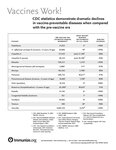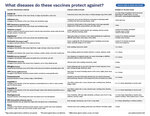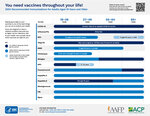


Babies, older children, teens, and even adults need vaccines. Vaccines protect us from serious diseases that can lead to severe complications, such as going deaf from the mumps, getting seriously ill, or dying from measles or the flu. The protection from some of the vaccines that we get as babies and young children wears off (wanes) over time. Older children, teens, and adults need ‘booster’ shots to help continue protecting us from these same diseases as we grow older; for example, getting a tetanus booster every ten years to protect us if we get infected from a cut, dirty wound, or needle prick.
Source: https://www.immunize.org/wp-content/uploads/catg.d/p4037.pdf
All adults should make sure they’re up to date on these routine vaccines:
For Children and Teens, visit the CDC schedules at www.cdc.gov/vaccines/parents/schedules/index.html.
For Adults:
Did you know there was a vaccine schedule for adults as well?
In fact, there are two (2). One is for all adults based on age, and the second is for adults with chronic medical conditions or factors that put them at high risk for the disease.
Here is an easy-to-read version:
It is okay to have questions about vaccines.
Know that vaccines are studied thoroughly before they are licensed for use in the public.
Scientists continually monitor vaccines for safety even after vaccines have been licensed.
Any medicine can cause side effects – this includes vaccines. Luckily, serious side effects from vaccines are rare. The most common side effects from all vaccines (shots) include redness, pain, and swelling to the area of the body where the vaccine was administered. These symptoms usually go away in a day or so and are mild. These are all signs that our immune system is reacting to what it thinks is a true germ entering our body. Our body acts as if it’s fighting a mild form of the germ, not because we are actually infected with the germ. Fever is one example of a side effect we may experience. Other side effects can include headaches and body aches/chills. All these also go away in a day or so and are mild. Some people may not experience side effects, but their immune systems are still working to provide protection.
It is okay to receive multiple vaccines (shots) in one day. Scientists have studied this for years.
Ingredients in vaccines serve a purpose – either to help our bodies build immunity (protection), to help keep the vaccine safe and long-lasting, or to make the vaccines more effective (work better). Neither vaccines nor the ingredients in vaccines cause autism. Decades of research and studies have shown that administering vaccines to children on the recommended childhood immunization schedule will not cause autism.
Finding vaccines for your family is easy. First, check with your primary care provider's office (pediatric provider, family practice provider, internist) and local health departments. Pharmacies are another option for receiving vaccines. Each state, however, has its own rules on which vaccines pharmacists can administer and to which ages.
Most private insurance companies cover vaccines. For people without insurance coverage:
Keeping track of your family's vaccine records is important. Ideally, you should receive a copy of your vaccine record every time a vaccine is administered. Records should be kept in a safe, secure space. States and some large cities also have secure immunization information systems (IIS) that keep electronic vaccine records for people in their state or city. Most of these registries only carry records for children and not adults, however.
Resources:
CDC: Vaccines for your Children
CDC: Vaccine Schedules for your Child and Teen
CDC: Vaccine Information for Adults
WHO: World Immunization Week 2024
For information about COVID-19 and Flu vaccines, visit the article in Star of Zion Staying Well This Winter
Comments
No comments on this item Please log in to comment by clicking here